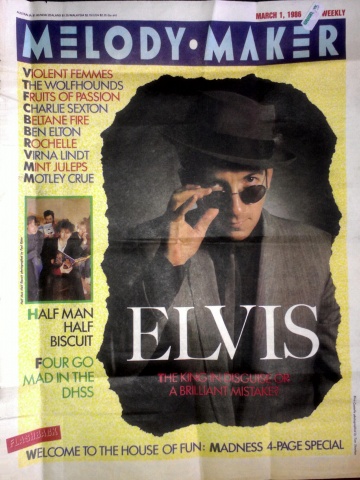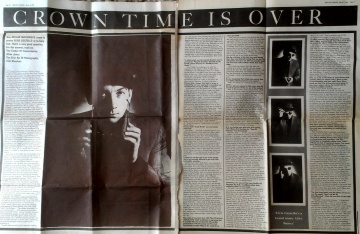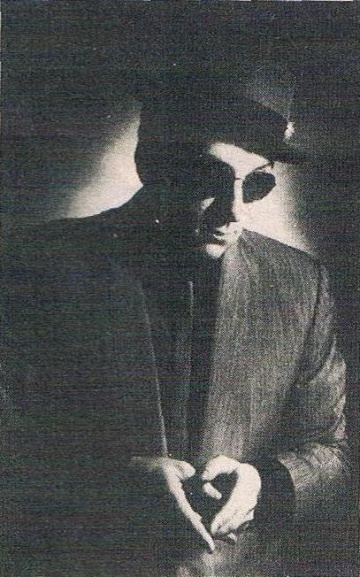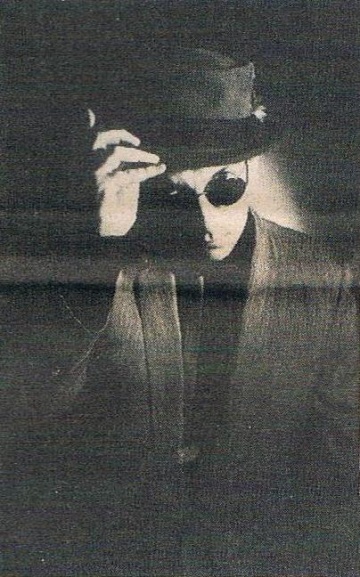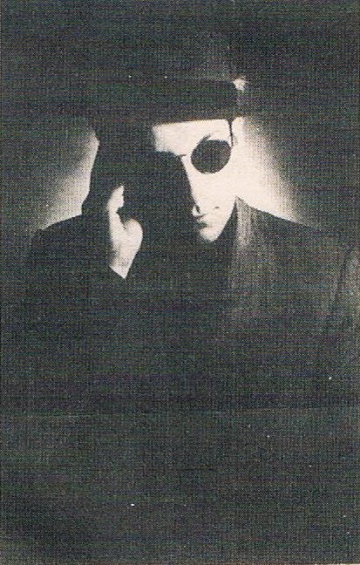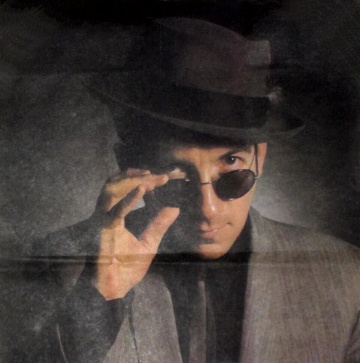|
Like some frantic salesman, Declan Patrick Aloysius Macmanus, as these days Elvis Costello prefers to call himself, has been everywhere these last two weeks, busily promoting his new LP, King Of America. The day we met, he'd just returned from a hectic whirl of interviews in New York: he complained, understandably, of tiredness, although there was not much fatigue evident in the energy and enthusiasm with which he approached the three and a half hours of our conversation. The next few days would be similarly devoted to the selling of the new album. For someone usually so shy of interrogation, it's been an unprecedented flurry of public explanation.
The cause has been worthwhile, however. King Of America is a resounding return to form and probably his most compelling and assured record in five years. Like Get Happy!! whose emotional frankness it recalls, King Of America reaches us after an unsettled year for its author. Get Happy!! appeared in the wake of the infamous Costello-Bonnie Bramlett-Stephen Stills brawl in Columbus, Ohio, from which Costello emerged in the eyes of the sanctimonious American press as a sinister bigot, with the commercial momentum of his career severely interrupted by the ensuing, vindictive backlash. King Of America arrives after a period of similar turmoil. Following the critical and commercial failure of Goodbye Cruel World in 1984, Costello had suspended The Attractions, toured only as a solo act, usually with the American songwriter T-Bone Burnett for company and support. He has produced The Pogues and The Big Heat; he has been involved in the score of Julien Temple's Absolute Beginners; he and T-Bone released "The Peoples' Limousine" under the name of The Coward Brothers; he appeared on Eurythmics' Be Yourself Tonight and made a memorable appearance at Live Aid. Mostly, though, he's kept his head down and in his absence, as it were, rumours began to swarm; he had become an alcoholic; he was creatively bankrupt; he'd stopped writing songs, he couldn't write any songs; his private life was in several stages of turmoil; he was going through a painful divorce.
According to the NME, the final authentication of these rumours was provided by the release of "Don't Let Me Be Misunderstood" as a trailer for the new LP. "An undisguised plea for compassion," declared Donny Kelly in his now celebrated review. Mr Kelly went onto describe Costello as in a creative slump, allude to his drink problem and the record itself as a "landmark in the nosedive of one of the great pop talents of the last decade." Costello's work has often inspired obsessive analysis, but this seemed journalistic presumption taken to quite bumptious extremes. Upon its arrival, however, King Of America has successfully checked the gossip. KOA finds Costello refreshed after the strained conceits of Punch The Clock and Goodbye Cruel World. Adopting a lucid, very straightforward writing style that largely abandons the slickly orchestrated word play that by his last releases was becoming wearisome, Costello has rarely written so affectingly. Or addressed his audience so directly: he sounds like he's writing songs again, not polishing devious epigrams.
Musically, too, there's a welcome break from recent forms. Produced by Costello, T-Bone and Larry Hirsch and recorded in the studio that during the Fifties had played host to Frank Sinatra, KOA makes spectacular use of the peerless musicianship of James Burton, Ron Tutt, Jerry Scheff, Jim Keltner — "the wildest drummer I've ever worked with" — and supreme jazzers Ray Brown and Earl Palmer. Former Costello stalwarts The Attractions appear on only one track, the controversial "Suit Of Lights," which has been widely written up as Declan's final farewell to the Elvis Costello persona, a notion that Costello has carefully encouraged without emphatically endorsing it.
Costello had arrived for this interview looking trim and dapper; clean-shaven, too, with no hint of the whiskers that give him such an hilariously woe-begone appearance on the darkly comic sleeve of KOA, where he looks like he's been ridden hard all night and hung up wet to dry. Basically, he only wanted to talk about the new album, but was soon off in a number of tangental directions. The edited account that follows is as comprehensive as space permits, but is probably already out of date. At the time of writing, the word is that Costello's already back in the studio recording a new album with The Attractions and produced by Nick Lowe.
To what extent was the musical direction you've pursued on King Of America dictated by the hostile critical response to Goodbye Cruel World?
I don't think it's anything to do with the response to that album. I think it might have something to do with the fact that it's a pretty terrible record. I just didn't have very many clear ideas at the time. i think I wrote the songs all too quickly and I didn't do enough preparation. Goodbye Cruel World wasn't a terribly troublesome record to make, it was just a bit laborious and therefore it lacked inspiration.
Did you think, though, that both in terms of songwriting and your approach to recording you were beginning merely to fulfill a routine?
In retrospect, yes. We started off to make a sort of live, open record, but Clive Langer and Alan Winstanley, those guys didn't have the right approach. That's no disrespect to them — in fact, they didn't even want to do that record, Clive just did it as a favour, really — but they've developed a way of working that's completely contrary to spontaneity. So really it was just a mistake. Everybody makes mistakes from time to time. Unfortunately, they're preserved on vinyl in this case. It's a shame because I think two or three of the songs I could've done much better now. "Joe Porterhouse," "The Comedians" and "The Deportees Club", some of those story songs, were the beginnings of the kind of writing I'm doing on this album. In fact, I've re-written "The Deportees Club". It's now a ballad, a really pretty song. I wanted to re-record it, but I didn't want people to think I was re-recording old songs because I haven't got any new ones, which isn't the case at all. "King Of America" could easily have been a double album.
Do you think "Cruel World" was too harshly criticised?
Not really... not that it matters much to me. After all, criticism is only reliant on what's been said about you in the past. It was almost like, "Well, thank Good for that. He's finally made a record we can really have a go at..." I'm sure in the past that I've been overly praised, so if people came down hard on that record, it was only because they were dying for the chance to do it. But I think you've got to be careful not to take criticism too seriously unless you can learn from it. You see, I didn't need to learn from the criticism of that album, because I already knew what was wrong with it. It's a bad record. So what? There were plenty of other bad records released that year.
It seems to me that you're one of the people who're not actually allowed to get away with such public mistakes.
Maybe, but I don't think that's very important. I think again that's holding it all too much under a microscope. It's a very critical perspective. I don't think the general public feel that way. I'm not that important for them to think like that about me. I mean, if The Beatles went in a wrong direction, or what people thought was a confusing direction, it really sat heavily on people. Like, Magical Mystery Tour was seen as a national disaster. Frank Sinatra was like that as well. If he went into an artistic decline, it affected a lot of people. People like myself, you know, I don't sell enough records, I don't have a big enough following for it to even effect the musical climate of the country if I make a bad record. But I don't sit around fretting over these things. It's a different world, it's a different business now. It's much more a sale of dreams. It always was, but there was perhaps more musical substance to it or artistic substance to it in the past. These days, there's nobody that's enormously popular and successful who is very good musically. I mean, look at George Michael. Music is only 50 per cent of what he does, and s the other 50 per cent that he does very well that makes him successful. There are people who are in the business of being famous, you know, and he's one of them. I'm not in the business of being famous. I just make records. I write songs. That's all I do.
The critics of your last tour with The Attractions seemed pretty much unanimous in agreeing that it sounded like you'd exhausted all possible permutations with the group and the most immediately sensible thing to do would be to retire gracefully...
Yeah, but we've always had reviews like that. We had terrible reviews even when we were really successful. When we were actually pop stars, in '79, when we were actually on the covers of the glossies and everything and we were having consistent Top 20 hits. You know the way critics always like to knock whoever's in the charts when they play live. We got all those reviews: "Oh, it was a machine-gun kind of delivery, they couldn't wait to get to the next gig..." The fact was that we were all out of our minds all the time.
But the criticisms of the last tour went beyond that: they were basically saying that you and The Attractions were in a rut, that you sounded jaded and tired and really needed a break from each other...
That might have been true. We were just working on a kind of neurotic nervous energy towards the end. We were totally exhausted. I was particularly exhausted. I'd worked literally from, like, the first week of January until that tour ended in October. I think I had five days holiday that year.
So you recognised that maybe you were by then at a fairly critical junction in your career?
Allan, I'm always at a critical junction in my career.
But how did you respond to this crisis, what did you do to get out of the rut, out of the routine?
Well, if you're really afraid of something, I think that sometimes all it takes to remove that fear is to actually admit that it exists. It happened to me once before, around the time of the Get Happy!! tour. I was going to quit then, I'd decided that that was going to be the last record and I really didn't know when or if I'd ever make another one. I decided to take six months off after that year. And it was almost the minute that I stopped feeling as though I was being compelled, either by myself, or the circumstances or just the routine, that I decided to carry on. All the dread went out of it and I immediately started writing furiously again and it suddenly became very clear to me what to do next. It was pretty much the same feeling this time. Once I realised that I didn't have to make another record that year, or the next spring or whenever, the way forward just became very clear. So I didn't quit. I didn't actually stop. In fact, I immediately went out and did another solo tour, which was a lot freer, you know.
So it was during your solo tours and working with T-Bone that the ideas for King Of America were formulated?
Basically, yeah... but the way you're phrasing it makes it all sound very serious, like we were plotting it all along. It wasn't quite like that. In fact, what happened was that I just started thinking more about the songs and much less about the records. And, because I was concentrating on the songs, as I started to write it became clear to me that I had to write very, very simple songs. I started taking out all the musical kinks. As I've said, the story-telling technique was already there in some of the songs on Goodbye Cruel World, but it was out-of-focus. I was aware in retrospect that I hadn't been weighing the words properly, I hadn't been making them clear enough. So I thought, if I'm going to tell a story, then I shouldn't perhaps rely so much on the grammatical pin-boll and just say it clearly. Particularly, once I'd decided that the music should be really clear and simple, it seemed inappropriate to weave any kind of too mysterious a tole. Also, the things I wanted to say were suddenly very clear to me. And suddenly in some way, I don't know why, it just seemed a lot easier for me to say something straight out. Even the songs that aren't stories, that are just expressions of a feeling, the love songs of one kind or another, they're very, very straightforward.
Sometimes, it's seemed that your facility for language has had a muddling rather than clarifying effect in your songs.
Oh yeah, you can just lose yourself in words. You know, sometimes deliberate obscurity is a good device, at other times it's just bloody annoying. I don't think that there are many obscure lines on the new record. I think the lyrics are very, very clear. When we were doing the album, one of the things T-Bone wouldn't let me do was tinker with the songs. That was one of the neurotic diseases left over from the unsuccessful Attractions recording sessions: my tendency to tinker with a song, even as we were going along. There'd be nothing wrong with a song, but because we didn't get it in three takes, I'd start re-writing it, and sometimes I wouldn't make it any better. But that's one of the things I avoided on this album, because I knew all the songs were basically written properly. I knew they were all finished, and I knew they were saying exactly what I wanted to say. I mean, there are no hidden meanings on any of the songs on King Of America. They just say it straight out. Like, "I'll Wear It Proudly", that's perhaps one of the straightest love songs I've ever written.
To allow yourself that explicitness of meaning, did it follow automatically then that you'd have to record the album without The Attractions?
No, because it wasn't planned to be done without them. It was planned to be half solo and half with The Attractions, originally. Then, when I was in Australia with T-Bone, there was some suggestion that we might use a couple of other faces on it. We just started talking, a bit like people drawing up their ideal football team. And we started thinking, 'Well, if the song is the most important thing, then the vocal, everything, must serve that.' And then we started drawing up this list, the ideal players for the songs. The Attractions, I had in mind to do maybe five songs, but they ended up on only one. That's because so many of the songs recorded in the first week with the TCB guys turned out so well they ended up on the final album. It wasn't a case of these people being better than The Attractions, they were just right for those songs.
Even so, I was at the Duke of York theatre last summer when you played with T-Bone as the Coward Brothers and that night Steve Nieve found out that The Attractions were going to play only a minor role on the record and he seemed incredibly resentful.
He was just drunk. And he gets very unreasonable when he's drunk. He just felt threatened and he simply hadn't had the full plans explained to him. It was like some of the road crew who'd been on the solo tour overheard some plans, got hold of the wrong end of the stick and proceeded to beat him around the head with it. And he came in all upset about it and I was going on holiday the next day and I wasn't exactly in the mood to start discussing it. It was just one of those unfortunate nights that other people had to be privy to. Those things happen all the time at work. They must happen in your office in the same way. It's not a big drama. But, of course, because there was an extended silence from the group, people read into it. There were some stories about there being an unsettled feeling within the group. I don't know if that was just speculation or somebody speaking out of turn, probably with a few drinks down them in Dingwalls.
Both Steve and Pete Thomas seemed very protective about you, jealous, almost, that T-Bone had been commanding so much of your attention...
Well, basically, that's inevitable, you know. Basically, we're all old poofs. There is a bit of that in it. We have been together an awfully long time.
The kind of seething tension that always seems to characterise your recordings with The Attractions is remarkably absent from KOA, without any loss of emotional drama. You sound more relaxed, more inside the performances.
I think that's probably true. For one thing, we tended to do things that I'd got out of the habit of doing. You know the way it is, if you go into a bar and you're sitting having a drink and you get a bit drunk, you might start telling your troubles to a stranger. You might tell a complete stranger about your most intimate dreams and desires, but you couldn't tell your best friends. Now, something of that happened between The Attractions and myself. I'd got a little bit more guarded about the meanings of the songs. You know, there's a point where you think you can see them going, "Oh, here he conies again, trotting out the same bloody songs, what's he going to be ranting about this week?" You're not sure, but it might be there in the backs of their minds. So I was becoming more guarded.. I think. And it struck me that if I was going to get people like James Bur:on and Ron Tutt and Jerry Scheff actually involved in the record then I was going to have to do some explaining. So we just sat around in the studio and I played them the songs on an acoustic guitar and told them what they were about and if there were any secrets then I let them in on them.
The first thing heard from the album, of course, was the single, "Don't Let Me Be Misunderstood". What did you think of the NME review of it?
I thought it was really hilarious. "A knee-bent plea for compassion." Well, it's nice to know somebody cares, but it was so absurd. It was hysterical in both senses of the word. I don't know why so many people seem to get so upset over that record. It was only ever meant to be an introduction to the album. I think it's a really good version, actually. But people have said, "Why the hell is he doing a cover? After a year away, he doesn't even come back with one of his own songs." I think that's just idiotic. And, anyway, it wasn't meant to be a big deal, grandstanding, stop-the-world single. It wasn't such a big drama. I'm not going to have a nervous breakdown if you misunderstand me. I mean, I've been misunderstood for a long time. Maybe the sound
|
